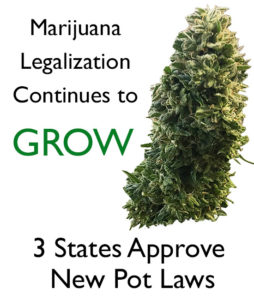written for Inspire Malibu

As the dust from the November 2018 election settles, voters in three states voted to approve new marijuana laws. Michiganders will soon have access to recreational marijuana, bringing the number of states that allow for recreational consumption to 10. Missouri and Utah voters cast their ballots for the use of medical cannabis. In total, 33 states in the U.S. now allow for some form of legal marijuana use.
“This is yet another historic election for the movement to end marijuana prohibition,” Steve Hawkins, executive director of Michigan’s Marijuana Policy Project, told the Huffpost. “Voters have once again sent a message loud and clear that it is time to legalize and regulate marijuana.”
The wins in Michigan and Missouri are evidence that support for recreational pot is creeping its way into to the generally more conservative Midwestern states.
Attitudes about marijuana consumption continue to ease up across a broad demographic swath of the country. The Pew Research Centers reports that around six-in-ten Americans, nearly 62 percent, believe the once reviled “gateway” drug should be legalized. Still, there are concerns and questions about the consequences of legalizing what the federal government continues to classify as a schedule I narcotic.
Putting pot in the same category as heroin, cocaine and methamphetamines, a class of drugs the government says have no accepted medical use and a high potential for abuse, makes it near impossible for researchers to do well-funded marijuana studies.
“There simply isn’t enough research into the impact of adult marijuana use to offer a lot of proven and practical health guidance,” writes the Los Angeles Times editorial board. “…the lack of evidence-based information poses a public health risk.”
Like alcohol abuse, experts know that marijuana consumption can come with serious negative side effects. Outside of, say, poor decision-making skills while “high” and a bad case of the “munchies,” chronic, long-term marijuana abuse can lead to some of the following symptoms:
- Respiratory issues
- Heart damage
- Social anxiety and paranoia, especially in people with existing mental health issues
- Depression
- Memory loss
- Addiction
There is also the societal cost of doing business when a new drug is legalized. For example, studies show that vehicle crashes rose as much as 6 percent in Washington, Nevada, Colorado and Oregon, some of the first states to adopt recreational marijuana laws. Driving while under the influence of alcohol and drugs is a serious sign of substance abuse and dependence.
The National Institute on Drug Abuse (NIDA) contradicts the narrative that pot is not addictive and hosts of health care experts agree. NIDA reports that around 30 percent of people who consume pot might have some degree of marijuana use disorder and that the earlier a person starting using pot, the more likely it is they’ll develop a dependency.
Because of the federal government’s position on marijuana, researchers are stuck working with “one hand behind their backs.” Criminal justice reform is yet another issue left in the wind. Federal penalties for marijuana distribution and possession are still steep, even while some states have loosened enforcement and lowered sentences for pot. There’s no doubt this pot-knot will be untied any time soon.
In the meantime, the momentum for legalizing recreational marijuana doesn’t seem to be slowing. In fact, America’s neighbor to north, Canada, passed nationwide recreational pot in October 2018. North America is steadily getting “greener.”
